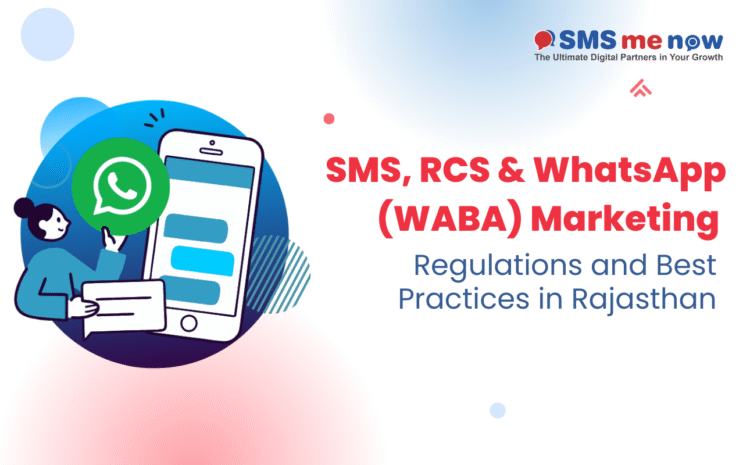SMS, RCS & WhatsApp (WABA) Marketing Regulations and Best Practices in Rajasthan
Introduction
SMS & WhatsApp Marketing Compliance in Rajasthan , In India’s rapidly evolving communication landscape, businesses now have multiple ways to reach customers — SMS, RCS, and WhatsApp Business API (WABA). However, with great reach comes great responsibility. Regulatory frameworks like TRAI and DLT ensure that consumers are protected from spam and misuse while businesses maintain ethical marketing standards.
For Jaipur and Rajasthan-based organizations, understanding these rules isn’t optional — it’s essential for campaign success, message deliverability, and long-term trust.
This article explains all current guidelines, common pitfalls, and proven best practices to keep your messaging campaigns compliant, efficient, and profitable.
Understanding TRAI & DLT Regulations
What Is TRAI?
TRAI (Telecom Regulatory Authority of India) regulates all telecom communications, including bulk messaging. It enforces policies that ensure fair usage and protect consumers from spam or fraudulent messages.
What Is DLT?
DLT (Distributed Ledger Technology) is a blockchain-based system introduced by TRAI in 2020. Every business that sends promotional or transactional messages must register on the DLT platform to get approval for:
- Entity registration (your company)
- Header/Sender ID (e.g., “SMSNOW”)
- Message templates (approved formats)
- Consent templates (user opt-in confirmation)
Without DLT registration, your messages may be blocked or blacklisted by telecom operators.
Why Compliance Matters
- Message Deliverability: Unregistered templates or headers often get filtered out by operators.
- Brand Reputation: Non-compliance leads to blacklisting and loss of customer trust.
- Legal Protection: TRAI imposes fines and suspensions for spamming or data misuse.
- Customer Trust: Following consent and opt-out protocols improves brand credibility.
Key Rules for SMS, RCS & WABA Marketing
| Channel | Regulation Type | Important Requirements |
| Bulk SMS | TRAI + DLT | Entity registration, approved sender ID, pre-approved templates, DND filtering |
| RCS Messaging | OEM + Operator Approval | Verified brand profiles, message approval (content + rich media), opt-in required |
| WhatsApp Business API (WABA) | Meta Business Policy | Template approval, opt-in via website/QR/form, adherence to privacy policies |
Best Practices for Compliance & Performance
✅ 1. Always Register on DLT
Use official operator portals such as:
- Jio DLT: https://trueconnect.jio.com
- Airtel DLT: https://www.airtel.in/business/commercial-communications
- BSNL / Vodafone DLT portals
✅ 2. Use Approved Templates Only
Create distinct templates for promotional, transactional, and service-based messages. Avoid editing or adding variables outside of approved placeholders.
✅ 3. Get Explicit Customer Consent
You must collect user opt-in via website forms, WhatsApp opt-in, or signed consent.
✅ 4. Send Messages at the Right Time
TRAI allows promotional messages only between 9 AM and 9 PM. Transactional alerts are allowed anytime.
✅ 5. Maintain Opt-Out Option
Allow customers to unsubscribe easily (via SMS reply or web form).
✅ 6. Keep Messages Transparent
Avoid misleading offers, short URLs that hide destinations, or messages without identification.
✅ 7. Follow RCS & WhatsApp Verification
Get verified sender status (blue tick or brand logo) to improve trust and prevent impersonation.
✅ 8. Keep Audit Trails
Save consent logs, template approvals, and campaign reports for audit purposes.
Recent Updates (2024–2025)
- DLT Template Suffix Rules: TRAI now mandates suffixes in sender IDs to denote type:
- -T = Transactional
- -P = Promotional
- -S = Service
- AI-based Spam Detection: Operators now use AI filters to detect and block spammy templates automatically.
- Opt-in Reconfirmation: Periodic re-verification of consent lists may soon be required for high-volume senders.
- WhatsApp Template Categorization: Meta now separates templates as Utility, Marketing, and Authentication with individual approval and pricing models.
Case Example: Jaipur-Based NBFC
A local NBFC in Jaipur used non-registered promotional templates for EMI reminders, leading to 60% message failure. After registering properly on DLT and switching to approved templates, they achieved:
- 98% delivery rate
- 30% improvement in customer payment compliance
- Zero regulatory issues in quarterly audits
Common Mistakes to Avoid
- Using one sender ID for multiple message types
- Copy-pasting promotional text into transactional templates
- Sending to DND numbers without consent
- Ignoring opt-out requests
- Using unapproved third-party SMS vendors
FAQ (Frequently Asked Questions)
| Question | Answer |
| Q: Do small businesses also need DLT registration? | Yes, all entities — even small traders or schools — must register to send bulk or promotional SMS. |
| Q: Can I use the same template across all operators? | You can, but it must be approved on each DLT platform you use. |
| Q: Are WhatsApp and RCS regulated by TRAI? | No, but they follow global privacy and opt-in policies that align with TRAI’s intent. |
| Q: Can I send messages to DND numbers? | Only transactional or consent-based service messages can be sent. Promotional SMS are restricted. |
| Q: What are the penalties for violations? | TRAI may suspend headers, block messages, or impose penalties up to ₹10,000 per instance for severe breaches. |
Conclusion
Compliance isn’t just a formality — it’s the foundation of sustainable marketing success. When your business follows TRAI, DLT, and Meta guidelines, your messages reach the right customers safely and effectively.
By combining compliance with creativity — clear messaging, proper targeting, and regional personalization — your brand can stand out as a trusted communication partner in Rajasthan’s growing digital ecosystem.




